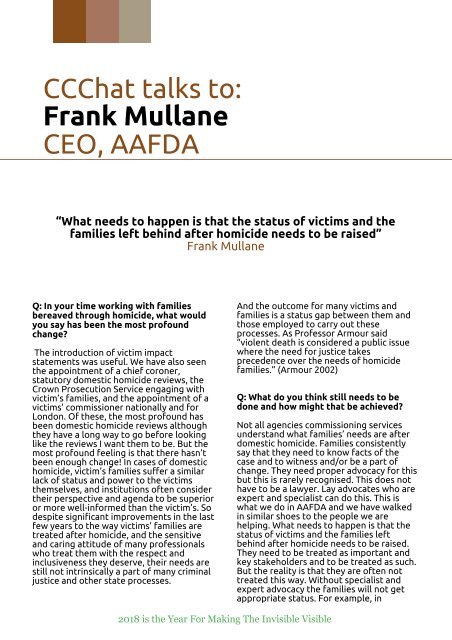CCChat-Magazine_5
Create successful ePaper yourself
Turn your PDF publications into a flip-book with our unique Google optimized e-Paper software.
<strong>CCChat</strong> talks to:<br />
Frank Mullane<br />
CEO, AAFDA<br />
“What needs to happen is that the status of victims and the<br />
families left behind after homicide needs to be raised”<br />
Frank Mullane<br />
Q: In your time working with families<br />
bereaved through homicide, what would<br />
you say has been the most profound<br />
change?<br />
The introduction of victim impact<br />
statements was useful. We have also seen<br />
the appointment of a chief coroner,<br />
statutory domestic homicide reviews, the<br />
Crown Prosecution Service engaging with<br />
victim’s families, and the appointment of a<br />
victims’ commissioner nationally and for<br />
London. Of these, the most profound has<br />
been domestic homicide reviews although<br />
they have a long way to go before looking<br />
like the reviews I want them to be. But the<br />
most profound feeling is that there hasn’t<br />
been enough change! In cases of domestic<br />
homicide, victim’s families sufer a similar<br />
lack of status and power to the victims<br />
themselves, and institutions often consider<br />
their perspective and agenda to be superior<br />
or more well-informed than the victim’s. So<br />
despite signiicant improvements in the last<br />
few years to the way victims’ families are<br />
treated after homicide, and the sensitive<br />
and caring attitude of many professionals<br />
who treat them with the respect and<br />
inclusiveness they deserve, their needs are<br />
still not intrinsically a part of many criminal<br />
justice and other state processes.<br />
And the outcome for many victims and<br />
families is a status gap between them and<br />
those employed to carry out these<br />
processes. As Professor Armour said<br />
“violent death is considered a public issue<br />
where the need for justice takes<br />
precedence over the needs of homicide<br />
families.” (Armour 2002)<br />
Q: What do you think still needs to be<br />
done and how might that be achieved?<br />
Not all agencies commissioning services<br />
understand what families’ needs are after<br />
domestic homicide. Families consistently<br />
say that they need to know facts of the<br />
case and to witness and/or be a part of<br />
change. They need proper advocacy for this<br />
but this is rarely recognised. This does not<br />
have to be a lawyer. Lay advocates who are<br />
expert and specialist can do this. This is<br />
what we do in AAFDA and we have walked<br />
in similar shoes to the people we are<br />
helping. What needs to happen is that the<br />
status of victims and the families left<br />
behind after homicide needs to be raised.<br />
They need to be treated as important and<br />
key stakeholders and to be treated as such.<br />
But the reality is that they are often not<br />
treated this way. Without specialist and<br />
expert advocacy the families will not get<br />
appropriate status. For example, in<br />
domestic homicide reviews, families are<br />
2018 is the Year For Making The Invisible Visible


















